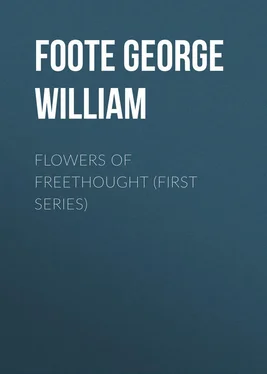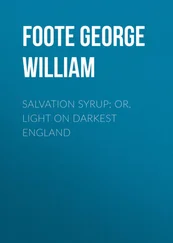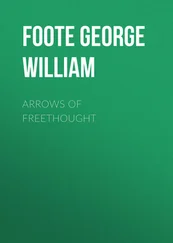George Foote - Flowers of Freethought (First Series)
Здесь есть возможность читать онлайн «George Foote - Flowers of Freethought (First Series)» — ознакомительный отрывок электронной книги совершенно бесплатно, а после прочтения отрывка купить полную версию. В некоторых случаях можно слушать аудио, скачать через торрент в формате fb2 и присутствует краткое содержание. Жанр: foreign_antique, foreign_prose, на английском языке. Описание произведения, (предисловие) а так же отзывы посетителей доступны на портале библиотеки ЛибКат.
- Название:Flowers of Freethought (First Series)
- Автор:
- Жанр:
- Год:неизвестен
- ISBN:нет данных
- Рейтинг книги:3 / 5. Голосов: 1
-
Избранное:Добавить в избранное
- Отзывы:
-
Ваша оценка:
- 60
- 1
- 2
- 3
- 4
- 5
Flowers of Freethought (First Series): краткое содержание, описание и аннотация
Предлагаем к чтению аннотацию, описание, краткое содержание или предисловие (зависит от того, что написал сам автор книги «Flowers of Freethought (First Series)»). Если вы не нашли необходимую информацию о книге — напишите в комментариях, мы постараемся отыскать её.
Flowers of Freethought (First Series) — читать онлайн ознакомительный отрывок
Ниже представлен текст книги, разбитый по страницам. Система сохранения места последней прочитанной страницы, позволяет с удобством читать онлайн бесплатно книгу «Flowers of Freethought (First Series)», без необходимости каждый раз заново искать на чём Вы остановились. Поставьте закладку, и сможете в любой момент перейти на страницу, на которой закончили чтение.
Интервал:
Закладка:
The services of the black-coats are imaginary, and their payment should be of the same description. Let them live on their own faith, and trust to him who fed Elijah in the desert with sandwiches brought by ravens' beaks.
Clearly the belief in spooks is profitable to the clergy. Just as clearly it is expensive to the people. Whistling between the hedges is as good as keeping a parson. But that is not the priest's teaching. He says the spooks are real, and he is the only person to keep them off. Grant the first point, and the second is sure to follow. But are the spooks real? Can the clergy show a single live specimen? They cannot, and they know they cannot, either for love or money. Why then does the business hold out? Because an imaginary spook is as good as a real spook, if the clergy can twist and prejudice the youthful mind in their direction. If a showman never lifts the curtain, it does not matter whether he has anything or nothing on the other side.
The belief in spooks is more than profitable to the priests. It enervates and paralyses the human mind. It is the parent of all sorts of mischief. It is our worst inheritance from our savage progenitors. The black spirits that haunted the swamps and forests of primeval ages, and terrified the ape-man who lived in mystery and fear, are not suffered to depart with the ignorance that gave them birth. They are cultivated by priests, and used to overawe the cradles and schools of civilisation.
The Freethinker does not fight spooks. He would not waste an ounce of powder upon them. He fights the fighters of spooks. He assails the superstition on which they flourish. He seeks to free the human mind from gratuitous fears. He dispels the shadows and deepens the sunshine of life.
Surely this is a good work. Whoever takes part in it is giving the race an unmixed blessing. War with the army of enslavement! Down with the seducers of childhood – the spiritual profligates who debauch the youthful mind! Banish them, with their spooks, from the school, the college, the court of justice, the hall of legislation! Let us train generations of sound minds in sound bodies, full of rich blood, and nervous energy, and frank inquiry, and dauntless courage, and starry hope; with faces that never pale at truth, hearts that hold no terms with falsehood, knees that never bend before power or mystery, heads that always keep a manly poise, and eyes that boldly challenge all things from height to depth.
DAMNED SINNERS
"Thou shalt be brought unto the blood of sprinkling, as an undone helpless, damned sinner."
– John Wesley, Sermon on "Justification by Faith."Polite ears, which are often the longest, will be shocked at the title of this article. This is an age in which it is accounted vulgar to express plain doctrines in plain language. Spurgeon was the last doctor of a good old school. Their theology was hateful: an insult to man and a blasphemy against God – if such a being exists; but they did not beat about the bush, and if they thought you were booked for hell, as was most likely, they took care to let you know it. They called a spade a spade, not a common implement of agricultural industry. They were steeped in Bible English, and did not scruple to use its striking substantives and adjectives. When they pronounced "hell" they aspirated the "h" and gave the full weight of the two "l's." "Damn" and "damnation" shot from their mouths full and round, like a cannon ball sped with a full blast of gunpowder.
But, alas, how are the mighty fallen! No longer do the men of God indulge in thunderous Saxon. They latinise their sermons and diminish the effect of terrible teaching. You shall hear them designate "hell" with twenty roundabout euphemisms, and spin "damnation" into "condemnation" and "damned" into "condemned," until it has not force enough to frighten a cat off a garden wall.
Let us not be blamed, however, if we emulate the plain speech of the honest old theologians, and of the English Bible which is still used in our public schools. We despise the hypocritical cry of "vulgar!" We are going to write, not on "condemned transgressors," but on "damned sinners." Yes, DAMNED SINNERS.
Now, beloved reader, it behoves us to define and distinguish, as well as amplify and expatiate. We must therefore separate the "damned" from the "sinners." Not indeed in fact, for they are inseparable, being in truth one and the same thing; for the adjective is the substantive, and the substantive is the adjective, and the "damned" are "sinners" and "sinners" are the "damned." The separation is merely mental , for reasons of convenience ; just as we separate the inseparable, length from breadth, in our definition of a line. This is necessary to clear and coherent thought; man's mind being finite, and incapable of operating in all directions at once.
What then are sinners ? A simple question, but not so easy to answer. All men are sinners . But what is a man ? A featherless biped? So was the plucked fowl of Diogenes. A man is – well a man; and a sinner is – well a sinner. And this is near enough for most people. But it does not satisfy a rational investigator, to say nothing of your born critic, who will go on splitting hairs till his head is as bare as a plate, and then borrow materials from his neighbor's cranium.
In ancient Egypt it was a sin to kill a cat; in England cats are slain in myriads without a tremor of compunction. Among the Jews it is a sin to eat pork, but an English humorist writes you a delicious essay on Roast Pig. Bigamy is a sin in the whole of Europe but the south-eastern corner, and there it is a virtue, sanctioned by the laws of religion. Marrying your deceased wife's sister is a sin in England; four thousand years ago, in another part of the world, it was no sin at all; in fact, a gentleman of remarkable piety, whom God is said to have loved, married his wife's sister without waiting for a funeral. Did not Jacob take Rachel and Leah together, and walk out with them, one on each arm?
Sin as a fact changes with time and place. Sin as an idea is disobedience to the law of God; that is, to the doctrines of religion; that is, to the teaching of priests. Crime is quite another thing. It is far less heinous, and far more easily forgiven. Of course crime and sin may overlap; they may often be the same thing practically; but this is an accident, for there are crimes that are no sins, and sins that are no crimes. It is a crime, but not a sin, to torture a heretic; it is a sin, but not a crime, to eat meat on a Friday.
A sinner is a person on bad terms with his God. But who, it may be asked, is on good terms with him? No one. According to Christianity, at any rate, we have all sinned; nay, we are all full of original sin; we derived it from our parents, who derived it from Adam, who caught it from Old Nick, who picked it up God knows where. Now every sinner is a damned sinner. He may not know it, but he is so; and the great John Wesley advises him to recognise it, and come as a "damned sinner" to God, to be sprinkled or washed with the blood of Christ.
What is damned then? We take it that "damned sinners," that is all sinners, are persons to whom God says "Damn you!" To whom does he say it? To all sinners; that is, to all men. And why does he say it? Because he is wroth with them. And why is he wroth with them? Because they are sinners. And why are they sinners? Because they are men. And why are they men? Because they cannot help it. They were born in sin and shapen in iniquity, and in sin did their mothers conceive them.
Every Christian admits this – theoretically. He goes to church and confesses himself a "miserable sinner," but if you called him so as he came out of church he would call you something stronger.
Читать дальшеИнтервал:
Закладка:
Похожие книги на «Flowers of Freethought (First Series)»
Представляем Вашему вниманию похожие книги на «Flowers of Freethought (First Series)» списком для выбора. Мы отобрали схожую по названию и смыслу литературу в надежде предоставить читателям больше вариантов отыскать новые, интересные, ещё непрочитанные произведения.
Обсуждение, отзывы о книге «Flowers of Freethought (First Series)» и просто собственные мнения читателей. Оставьте ваши комментарии, напишите, что Вы думаете о произведении, его смысле или главных героях. Укажите что конкретно понравилось, а что нет, и почему Вы так считаете.












